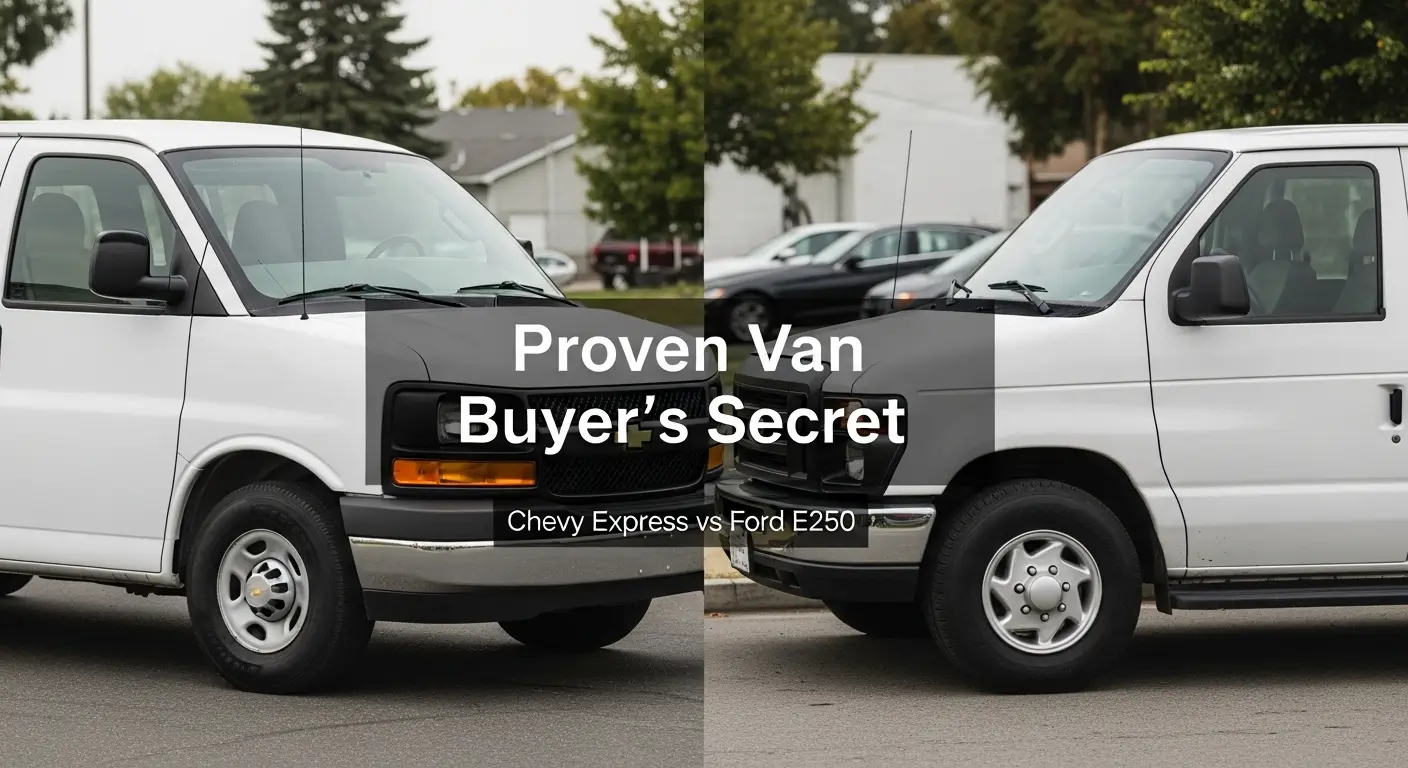When it comes to dependable work vans, two names often rise to the top: the Chevy Express and the Ford E250. Whether you’re a contractor, fleet manager, or someone exploring a vanlife conversion, choosing between these two comes down to more than just engine specs.
Both models have long histories of reliability, towing strength, and practical design. The Ford E250, part of the E-Series line, is known for its strong payload and affordable ownership costs. Meanwhile, the Chevy Express stands out for its towing capacity and wide availability on the used market.
But which van is truly better for your specific needs—commercial hauling, DIY camper builds, or long-distance travel? This guide compares them side by side, digging into real-world performance, maintenance costs, conversion potential, and resale value.
We’ve also tapped into insights from van owners, mechanics, and forum communities like VanLivingForum, SportsMobileForum, and NC4x4 to give you practical advice that goes beyond the brochure.
In this article, you’ll discover how the Chevy Express stacks up against the Ford E250 for work, vanlife, and everything in between.
Quick Comparison Snapshot
Choosing between the Chevy Express and Ford E250 can feel overwhelming, but here’s a simple breakdown to help you decide quickly. These two vans have different strengths depending on how you plan to use them — for vanlife builds, worksite hauling, or even towing heavy loads.
The Ford E250 offers higher payload capacity and slightly better fuel economy, making it a solid choice for daily work routes. On the other hand, the Chevy Express is known for stronger towing capacity and a simpler design that appeals to DIY mechanics and long-haul drivers.
At a Glance: Ford E250 vs Chevy Express
| Feature | Ford E250 | Chevy Express |
| Towing Capacity | ~7,000 lbs | Up to 10,000 lbs |
| Payload Capacity | 6,870 lbs (approx.) | 3,280 lbs (approx.) |
| Fuel Economy (Est.) | Slightly better | Lower, but more power |
| Ideal For | Contractors, fleets | Towing, van conversions |
Driving Experience & Ride Quality
Driving the Chevy Express and Ford E250 feels quite different, especially if you’re using them every day.
The Chevy Express drives more like a pickup truck—it’s strong and tough, great for towing heavy loads like trailers or equipment. It can tow up to 10,000 lbs, which is a big plus for work. But when the van is empty, the ride can feel a bit stiff, and it doesn’t get the best fuel mileage.
The Ford E250, on the other hand, feels smoother and easier to control, especially on bumpy roads or long trips. It handles better around corners and offers slightly better fuel economy, which is helpful for city driving or daily work routes.
If you’re building a camper van, both are easy to drive with practice. Still, many vanlifers say the E250 is more comfortable—a big deal when your van doubles as your home.
Maintenance & Reliability Records
Both the Chevy Express and Ford E250 have strong reputations for being reliable vans, but they need different types of care.
The Chevy Express is known for its simple design, which makes it easier and cheaper to fix. Parts are easy to find, and many mechanics (or even DIYers) are familiar with it. That’s why it’s a popular choice for businesses and van builders who want something dependable and low-hassle.
The Ford E250 is also very reliable—especially when carrying heavy loads. But it usually needs more regular maintenance, especially if it’s an older model. If well taken care of, it can last over 300,000 miles. However, some model years have had transmission issues, so it’s smart to check the van’s service history.
People on forums like VanLivingForum and NC4x4 say both vans can handle tough use—as long as you stay on top of maintenance and do a good inspection before buying used.
Which One is Better for Converting into a Camper?
If you’re planning to build a camper van, both the Chevy Express and Ford E250 are solid options—each with different strengths.
The Ford E250 is a favorite among vanlifers because it has more space inside and is easier to build into a cozy home on wheels. Its flat floor and optional high roof make it simple to add things like insulation, cabinets, or solar systems. Plus, there are tons of aftermarket parts made just for camper conversions.
The Chevy Express stands out for its strong towing power and tough design. It’s great if you want to pull a trailer or carry heavy gear. Many DIY builders also like it because the mechanics are simple and repairs are easy to do yourself.
People on forums like VanLivingForum say the Ford is a bit easier to convert and gets better gas mileage on long trips, but the Chevy wins on durability and power.
Commercial Use Case Breakdown
For work purposes, both the Chevy Express and Ford E250 offer solid options—depending on what kind of job you do.
The Ford E250 is great for trades like plumbing, electrical, or mobile detailing. It can carry heavier loads, has a smoother ride, and gets better gas mileage when loaded. This makes it a smart choice for daily driving and job routes.
The Chevy Express is better suited for contractors who need to tow heavy trailers or equipment. Its strong, durable build can handle rough jobsite conditions, which is why it’s often used in construction or delivery services.
If you own a fleet or small business, it’s important to think about repair costs and how easy it is to find parts. Both vans have good support, but the Ford may save more fuel over time, especially on long trips.
Cost Comparison Over Time
When picking between the Chevy Express and Ford E250, it’s smart to think about how much each van will cost you over time.
The Chevy Express is often a bit cheaper if you’re buying used, mainly because there are so many of them out there. On the other hand, the Ford E250 usually gets better gas mileage, which can save you money if you drive a lot.
Chevy’s simple design makes repairs easier and often less expensive. The Ford might need more regular maintenance, but it usually holds its value better in the long run.
Insurance and parts are pretty similar for both vans. If you’re running a business or a fleet, it’s important to think about these costs before choosing.
VIII. Parts & Upgrade Ecosystem
Both the Chevy Express and Ford E250 have great support when it comes to parts and upgrades—but they shine in different ways.
The Chevy Express has been around for a long time, so parts are easy to find and usually affordable. This makes it a great choice for DIY mechanics or businesses that want to keep repair costs low. Its simple design also makes fixes quick and less stressful.
The Ford E250 is a favorite in the vanlife and off-road world. There are tons of upgrade options—like roof racks, lift kits, and camper gear—made just for this van. If you’re planning to turn your van into a camper or adventure rig, Ford offers more choices.
Overall, Chevy wins for easy, low-cost maintenance, while Ford is better for custom upgrades and conversions.
Ford vs Chevy Culture
Choosing between the Chevy Express and Ford E250 isn’t just about specs—it’s also about personal preference and brand loyalty. Many people have strong opinions based on what they’ve driven or worked with over the years.
Ford fans often love the E250 for its tough, reliable build. It’s seen as a strong work van, especially in areas like the South and Midwest. For them, Ford means durability and getting the job done.
Chevy lovers, especially in cities and on the East Coast, like the Express for its strong towing power and simple design. It’s also a favorite for vanlife conversions.
In online forums, you’ll find fun debates, jokes, and helpful advice—showing that this choice is about more than just numbers.
Side-by-Side Decision Matrix
Here’s a quick snapshot comparing the Chevy Express and Ford E250 across key categories to help you decide:
| Criteria | Winner | Notes |
| Towing Capacity | Chevy Express | Best for heavy trailers |
| Payload Capacity | Ford E250 | Ideal for heavy loads |
| Fuel Economy | Ford E250 | Slightly more efficient |
| Maintenance Costs | Chevy Express | Simpler, cheaper repairs |
| Conversion Ease | Ford E250 | More space and aftermarket options |
Each van has its strengths — pick based on whether towing, payload, or customization matters most for your needs.
Reader Q&A
Q: What is the Ford version of the Chevy Express?
A: The Ford E-Series, especially the Ford E250, has traditionally been the closest competitor to the Chevy Express. However, the newer Ford Transit is increasingly taking its place in the market.
Q: Are Chevy Express vans reliable?
A: Yes, Chevy Express vans are generally reliable, known for their simple mechanics and durability, especially with regular maintenance.
Q: How long do Chevy Express engines last?
A: With proper care, engines in the Chevy Express can last 250,000 to 300,000 miles, making them a solid long-term investment.
Q: What is the gas mileage on a Ford E250?
A: The Ford E250 averages about 13-15 mpg in the city and up to 17 mpg on highways, depending on load and driving conditions.
Conclusion
Choosing between the Chevy Express and Ford E250 really comes down to what you need most. If you care about towing power and a simple design, the Chevy might be right for you. If comfort, fuel savings, and easy upgrades matter more, the Ford could be a better fit. Both vans are solid, dependable, and popular for work and vanlife. Think about how you’ll use your van, and pick the one that fits your lifestyle and goals best.





